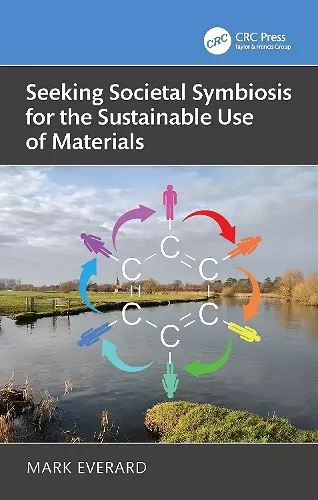Seeking Societal Symbiosis for the Sustainable Use of Materials
Format:Paperback
Publisher:Taylor & Francis Ltd
Publishing:18th Aug '25
£44.99
This title is due to be published on 18th August, and will be despatched as soon as possible.

We live in a material world; one with a rising population dependent upon a base of natural resources that is already seriously depleted and declining rapidly. This book considers the societal use of materials, historically, in the less-than-optimal present and aspirationally as a central thread in addressing wider sustainable development challenges. It accounts for linked chemical, physical and socio-economic consequences right through value chains, from raw material extraction through manufacture and use and onwards to post-use.
Author Mark Everard proposes that the four principal societal sectors – business, government, civil society organisations and knowledge-providers – though often currently often dissipating effort by working antagonistically, can optimally work symbiotically around co-created and consensual long-term sustainability goals to accelerate necessary progress. Practical examples of ‘baby steps’ towards constructive collaboration within and between societal sectors are recognised, and lessons are drawn for how they can shape more committed and intentional collaboration for sustainable development.
Seeking Societal Symbiosis touches upon many aspects of science from chemistry, chemical engineering and material science, through to construction/built environment, sustainability, regulatory science, resources economics and social science. It will be valuable reading for industry managers and executives, the European Commission and MEPs, national regulators and legislators, university students and lecturers, and NGOs.
“This book addresses how the interconnected challenges of ongoing population growth, resource depletion, plummeting biodiversity, growing social inequality and related manifestations, such as climate change, put pressure on societal capacity to respond meaningfully and productively. Instead of accepting negative trends as inevitable, it argues succinctly for a different way of thinking and acting. It provides both the rationale and an approach to bringing disparate and often competing sectors of society together using a common language and framework to articulate and address the challenges spanning sectorial interests. Everard shows how reorienting societal resources with a shared understanding of the sustainability challenges and common goals can greatly magnify the impact of actions taken towards a more sustainable future. That is, he describes a symbiotic approach where the energies and investments of all sectors accelerate the necessary progress.
Crucially, this book bridges a gap in our understanding of how different societal sectors can be united to define roles, identify shared interests, and devise strategies that complement progress towards more sustainable material use. This message will be of particular interest to the chemicals industry as it seeks new pathways towards a cyclical economy.”
Dr Simon Vandestadt, Director, Senior Executive and Researcher, Specialist in peace, conflict, and sustainability, Pacific and Papua New Guinea
“There is a clear and pressing need for this book. The sustainable use of materials is a critical issue in addressing the intertwined challenges of environmental degradation, resource scarcity, and societal well-being. The book’s focus on societal symbiosis—highlighting collaborative approaches across sectors for sustainable materials use—is both timely and essential. As global awareness grows regarding the environmental and social impacts of material extraction, use, and disposal, there is a need for a paradigm shift towards more holistic and integrative approaches. This book uniquely addresses this gap by weaving together material science, ecological principles, regulatory frameworks, and societal cooperation.”
Dr You Wu, Assistant Professor in Sustainability Assessment, Warwick Manufacturing Group, University of Warwick, UK
ISBN: 9781041069225
Dimensions: unknown
Weight: unknown
224 pages